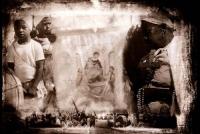 We demand that the Portuguese state, particularly the justice system, recognize the racial motivation behind this assault. We demand that, once and for all, it abandons a "minimalist" legal understanding of racism. We demand that it breaks away from the harmful pattern of denying racism, which endangers the lives of our children, our youth and the democratic life of this country.
We demand that the Portuguese state, particularly the justice system, recognize the racial motivation behind this assault. We demand that, once and for all, it abandons a "minimalist" legal understanding of racism. We demand that it breaks away from the harmful pattern of denying racism, which endangers the lives of our children, our youth and the democratic life of this country.
Mukanda
04.10.2023 | by vários
 In Portugal we have no racial-ethnic categorization legally approved. That means we are not legally able to identify social inequalities in terms of race. This is an important warning of how Portuguese society works and how this social silence from politics informs us that they are not interested in identifying this problem. But we can do this visually. Just look who are the people that are leading art institutions and curatorship to understand this gap. I created a blog - an informal exercise - where I put some information about this gap.
In Portugal we have no racial-ethnic categorization legally approved. That means we are not legally able to identify social inequalities in terms of race. This is an important warning of how Portuguese society works and how this social silence from politics informs us that they are not interested in identifying this problem. But we can do this visually. Just look who are the people that are leading art institutions and curatorship to understand this gap. I created a blog - an informal exercise - where I put some information about this gap.
Mukanda
13.03.2023 | by Rodrigo Ribeiro Saturnino (ROD)
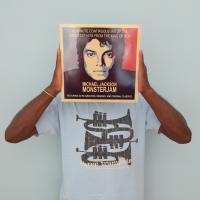 Balanced between various cultures, he has lived for 31 years in a more open and diverse Lisbon, an openness and diversity to which people like Lucky have contributed so much, from building the city to making the city dance.
This is a city of hard times, but also of encounters and possibilities with which he has grown up. In this text, we are led by the memories of Dj Lucky, between various sound tracks of quisange, semba, and afro blues, and multiple tracks on the floor, from Kinshasa to the Graça neighborhood, passing through Luanda, Cova da Moura, and Bairro Alto.
Balanced between various cultures, he has lived for 31 years in a more open and diverse Lisbon, an openness and diversity to which people like Lucky have contributed so much, from building the city to making the city dance.
This is a city of hard times, but also of encounters and possibilities with which he has grown up. In this text, we are led by the memories of Dj Lucky, between various sound tracks of quisange, semba, and afro blues, and multiple tracks on the floor, from Kinshasa to the Graça neighborhood, passing through Luanda, Cova da Moura, and Bairro Alto.
Face to face
15.11.2022 | by Marta Lança
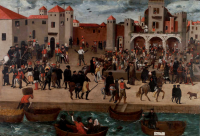 Today, we are learning that invisibility can shun and silence but cannot extinguish. And yes, colonialism can be unlearned; but to do so, it must first be confronted. Colonial amnesia is a political disease – and one for which we have yet to find a cure. Unlike the words uttered by Bruno Candé’s murderer, there are no more senzalas to return to. But, aligned with the theme of reckoning that brought us here today, to unlearn and decolonize, the past must be confronted. One way to start, would entail acknowledging the intersectionality of race-making and forge a vision of collective life not ruled by marked hierarchies.
Today, we are learning that invisibility can shun and silence but cannot extinguish. And yes, colonialism can be unlearned; but to do so, it must first be confronted. Colonial amnesia is a political disease – and one for which we have yet to find a cure. Unlike the words uttered by Bruno Candé’s murderer, there are no more senzalas to return to. But, aligned with the theme of reckoning that brought us here today, to unlearn and decolonize, the past must be confronted. One way to start, would entail acknowledging the intersectionality of race-making and forge a vision of collective life not ruled by marked hierarchies.
To read
01.04.2021 | by Patrícia Martins Marcos
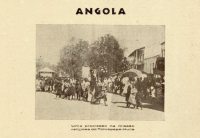 References to Portugal’s epic, seafaring past like these litter this city – there is even a Vasco da Gama shopping mall. But until now, there has never been a single explicit reference, memorial or monument in Portugal’s public space to its pioneering role in the transatlantic slave trade, nor any acknowledgement of the millions of lives that were stolen between the 15th and 19th centuries.
References to Portugal’s epic, seafaring past like these litter this city – there is even a Vasco da Gama shopping mall. But until now, there has never been a single explicit reference, memorial or monument in Portugal’s public space to its pioneering role in the transatlantic slave trade, nor any acknowledgement of the millions of lives that were stolen between the 15th and 19th centuries.
Games Without Borders
15.03.2021 | by Ana Naomi de Sousa
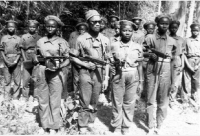 It is February 1964—one year into the armed struggle for independence in Guinea Bissau against Portuguese colonial rule. Cabral, the independence struggle’s leader, had called a conference in Cassaca for his African Party for the Independence of Guinea and Cape Verde (PAIGC) fighters to re-organize and address inter-party grievances.
The Cabral as seen in this and similar photographs, with his defiant stance, dark glasses, and signature knitted stocking cap in spite of the West African heat, would become the iconic image of the West African country. More than fifty years later, the image is still used to signify both Guinea Bissau’s victory in the 11-year independence struggle and the country’s continued hopes for the future. But what about the faces of the young women surrounding the independence hero? Directly to Cabral’s left in the image stands a round-faced, then 14-year old girl, Joana Gomes.
It is February 1964—one year into the armed struggle for independence in Guinea Bissau against Portuguese colonial rule. Cabral, the independence struggle’s leader, had called a conference in Cassaca for his African Party for the Independence of Guinea and Cape Verde (PAIGC) fighters to re-organize and address inter-party grievances.
The Cabral as seen in this and similar photographs, with his defiant stance, dark glasses, and signature knitted stocking cap in spite of the West African heat, would become the iconic image of the West African country. More than fifty years later, the image is still used to signify both Guinea Bissau’s victory in the 11-year independence struggle and the country’s continued hopes for the future. But what about the faces of the young women surrounding the independence hero? Directly to Cabral’s left in the image stands a round-faced, then 14-year old girl, Joana Gomes.
Games Without Borders
04.02.2021 | by Ricci Shryock
 Despite the importance of chattel slavery to the making of Portugal and its overseas empire, this terrifying history of black bondage is entirely muted in the public memory of Lisbon. In contrast to the (recently established and far overdue) National Museum of African American History and Culture in the United States or the Museu Afro Brasilin São Paulo, Brazil, there are no such museums or reckoning public memorials in Lisbon along the lines of the Mémorial de l’Abolition d’Esclavage as in Nantes, France. More recently, however, a slavery museum was established in the historic “Mercado de Escravos” (Slave Market) of the southern Portuguese port of Lagos, which is said to be the site of the first trade in enslaved Africans in Europe. Yet, Lisbon remains largely silent on its legacy of white terror and black captivity.
Despite the importance of chattel slavery to the making of Portugal and its overseas empire, this terrifying history of black bondage is entirely muted in the public memory of Lisbon. In contrast to the (recently established and far overdue) National Museum of African American History and Culture in the United States or the Museu Afro Brasilin São Paulo, Brazil, there are no such museums or reckoning public memorials in Lisbon along the lines of the Mémorial de l’Abolition d’Esclavage as in Nantes, France. More recently, however, a slavery museum was established in the historic “Mercado de Escravos” (Slave Market) of the southern Portuguese port of Lagos, which is said to be the site of the first trade in enslaved Africans in Europe. Yet, Lisbon remains largely silent on its legacy of white terror and black captivity.
City
04.02.2021 | by Yesenia Barragan
 The relevance of black participation in Portugal in the most diverse areas - including music - dates back several hundred years, but is rarely articulated in dominant public narratives. It is not, of course, that blacks in Portugal have no voice or are not present in the daily life of the country. It's often about talking without being considered, seeing without being seen, singing without being listened to - at least outside a cultural sphere that tends to be more circumscribed.
The relevance of black participation in Portugal in the most diverse areas - including music - dates back several hundred years, but is rarely articulated in dominant public narratives. It is not, of course, that blacks in Portugal have no voice or are not present in the daily life of the country. It's often about talking without being considered, seeing without being seen, singing without being listened to - at least outside a cultural sphere that tends to be more circumscribed.
Stages
01.02.2021 | by Inês Nascimento Rodrigues
 This article examines the impact of contemporary curating and cultural programming in the configuration of critical perspectives on Portugal’s postcolonial identity. It argues that visual creativity is forging a new paradigm in the Portuguese cultural field. In this context, postcolonial discourses are not silenced but, rather, aligned with international agendas in broader cultural initiatives mirroring the transformation of the main Portuguese cities into cosmopolitan, multicultural, and multiethnic enclaves.
This article examines the impact of contemporary curating and cultural programming in the configuration of critical perspectives on Portugal’s postcolonial identity. It argues that visual creativity is forging a new paradigm in the Portuguese cultural field. In this context, postcolonial discourses are not silenced but, rather, aligned with international agendas in broader cultural initiatives mirroring the transformation of the main Portuguese cities into cosmopolitan, multicultural, and multiethnic enclaves.
Games Without Borders
01.12.2020 | by Marta Lança and Carlos Garrido Castellano
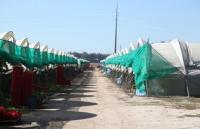 As night falls on São Teotónio, the lights are still on at the school. Three times a week, it stays open until midnight to hold classes for adults from the region, who come here at the end of a long day in the greenhouses – knowing they will need to speak some Portuguese in order to qualify for permanent residency. There are currently 500 adult students registered for night classes – almost matching the daytime intake of 600 children. Moldovan Vitali Siminionov, who picks flowers for a living, and whose two children both study at the school, joked: “They’re always correcting me saying ‘Dad, that’s not how you say it!”
As night falls on São Teotónio, the lights are still on at the school. Three times a week, it stays open until midnight to hold classes for adults from the region, who come here at the end of a long day in the greenhouses – knowing they will need to speak some Portuguese in order to qualify for permanent residency. There are currently 500 adult students registered for night classes – almost matching the daytime intake of 600 children. Moldovan Vitali Siminionov, who picks flowers for a living, and whose two children both study at the school, joked: “They’re always correcting me saying ‘Dad, that’s not how you say it!”
Games Without Borders
24.11.2020 | by Ana Naomi de Sousa
 The cumulative individual tragedies on slave trails to the coast, in the barracoons, and on the beaches: no one can even count. So the four centuries of African enslavement by Europeans remains an abstract story. The need to make it real, to find things that you can see, touch and feel is what most motivated me to participate in the ambitious documentary series Enslaved with Samuel L Jackson, to be broadcast on the BBC starting on Sunday. It’s an attempt to get away from the numbers and statistics and instead focus on the real people who endured this era – their flesh and bone, dreams and legacies.
The cumulative individual tragedies on slave trails to the coast, in the barracoons, and on the beaches: no one can even count. So the four centuries of African enslavement by Europeans remains an abstract story. The need to make it real, to find things that you can see, touch and feel is what most motivated me to participate in the ambitious documentary series Enslaved with Samuel L Jackson, to be broadcast on the BBC starting on Sunday. It’s an attempt to get away from the numbers and statistics and instead focus on the real people who endured this era – their flesh and bone, dreams and legacies.
To read
16.10.2020 | by Afua Hirsch
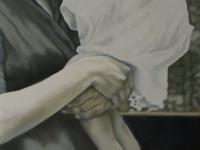 Some of these stories also show that such ‘returns’ to Angola by people of Nuno’s generation may actually be critical detours, when they give rise, upon returning to Portugal, to critical postures on the colonial persistence within Portuguese society. In this European context, could the Portuguese case represent an alternative: something that, through a post-colonial journey, may lead to a more egalitarian society that accepts a plural public retelling of the past?
Some of these stories also show that such ‘returns’ to Angola by people of Nuno’s generation may actually be critical detours, when they give rise, upon returning to Portugal, to critical postures on the colonial persistence within Portuguese society. In this European context, could the Portuguese case represent an alternative: something that, through a post-colonial journey, may lead to a more egalitarian society that accepts a plural public retelling of the past?
To read
29.07.2019 | by Irène dos Santos
 Europe is said to be currently facing the biggest refugee crisis since the Second World War. In the media, images of people escaping from their home countries devastated by war and misery and arriving to Europe are recurrent. As these pictures spread and instigate different reactions – some of them highly racist and xenophobic – another picture came to my mind: a picture of Lisbon in 1975 by Alfredo Cunha, shortly after the arrival of 6000 people from the Portuguese ex-colonies of Angola, Mozambique, Guinea-Bissau, São Tomé and Príncipe and Cape Verde.
in"Decolonizing Museums", L'Internacionale.
Europe is said to be currently facing the biggest refugee crisis since the Second World War. In the media, images of people escaping from their home countries devastated by war and misery and arriving to Europe are recurrent. As these pictures spread and instigate different reactions – some of them highly racist and xenophobic – another picture came to my mind: a picture of Lisbon in 1975 by Alfredo Cunha, shortly after the arrival of 6000 people from the Portuguese ex-colonies of Angola, Mozambique, Guinea-Bissau, São Tomé and Príncipe and Cape Verde.
in"Decolonizing Museums", L'Internacionale.
City
14.03.2016 | by Ana Bigotte Vieira
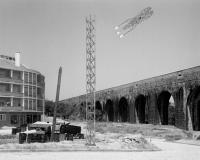 The text focuses on three operations – OPENING, REMOVAL and RESTITUTION - having Ana Hatherly’s work "As Ruas de Lisboa", Isabel Brison and Nuno Rodrigues de Sousa’s "O Monumento da Rotunda das Águas Livres", and Ana Bigotte Vieira’s "No Aleph – Notes about a research on Calouste Gulbenkian Foundation ACARTE Service (1984-1989)" as main sources. It is important to note that this text is being written in 2015, at a time when the brutal presence of a succession of absences in Portuguese recent history is felt more than ever. In fact, the current austerity policies point to the removal of a series of I would call ‘openings’ directly related to the Revolution on 25 April 1974 that overthrew António de Oliveira Salazar and Marcelo Caetano’s forty-eight year dictatorship and ended thirteen years of colonial wars. in"Decolonizing Museums", L'Internacionale
The text focuses on three operations – OPENING, REMOVAL and RESTITUTION - having Ana Hatherly’s work "As Ruas de Lisboa", Isabel Brison and Nuno Rodrigues de Sousa’s "O Monumento da Rotunda das Águas Livres", and Ana Bigotte Vieira’s "No Aleph – Notes about a research on Calouste Gulbenkian Foundation ACARTE Service (1984-1989)" as main sources. It is important to note that this text is being written in 2015, at a time when the brutal presence of a succession of absences in Portuguese recent history is felt more than ever. In fact, the current austerity policies point to the removal of a series of I would call ‘openings’ directly related to the Revolution on 25 April 1974 that overthrew António de Oliveira Salazar and Marcelo Caetano’s forty-eight year dictatorship and ended thirteen years of colonial wars. in"Decolonizing Museums", L'Internacionale
City
08.03.2016 | by Ana Bigotte Vieira
 We know that racism is the social, cultural and political result of eurocentrism, which created the need to mark, distinguish and separate racialized ethnic groups of the human community, on the basis of skin color and/or culture. The main leverage associated with this dehumanizing enterprise of racialized ethnic groups was set on the power to construct myths that have always justified racism. In that regard, far from constituting a mere repository of unconscious and harmless prejudices, as it is often made believe, the analysis of the political situation, with the strengthening of fascism and the rise of the far right in Europe, demonstrates that racism remains at the junction of contemporary institutional political practices and the slavocratic, imperial and colonial ideologies.
We know that racism is the social, cultural and political result of eurocentrism, which created the need to mark, distinguish and separate racialized ethnic groups of the human community, on the basis of skin color and/or culture. The main leverage associated with this dehumanizing enterprise of racialized ethnic groups was set on the power to construct myths that have always justified racism. In that regard, far from constituting a mere repository of unconscious and harmless prejudices, as it is often made believe, the analysis of the political situation, with the strengthening of fascism and the rise of the far right in Europe, demonstrates that racism remains at the junction of contemporary institutional political practices and the slavocratic, imperial and colonial ideologies.
To read
29.12.2014 | by Mamadou Ba
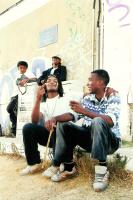 I set out to understand the modes of sociability of the Red Eyes Gang, a group of youths from Arrentela, Seixal, on the outskirts of Lisbon. The majority of them are children of African immigrants from countries that were formerly Portuguese colonies, and live in socioeconomic conditions well below those of the Portuguese. All were born in Portugal or arrived very young, never knowing their parents' countries of origin. However, they appropriate some of their ethnic and cultural heritages because of the stigmatization and racism to which they are subjected, reworking their condition of being poor and black. They do not mechanically reproduce the way of life and ethnic influences of their families, but reinvent them with imagination, thus producing positive statements about themselves.
I set out to understand the modes of sociability of the Red Eyes Gang, a group of youths from Arrentela, Seixal, on the outskirts of Lisbon. The majority of them are children of African immigrants from countries that were formerly Portuguese colonies, and live in socioeconomic conditions well below those of the Portuguese. All were born in Portugal or arrived very young, never knowing their parents' countries of origin. However, they appropriate some of their ethnic and cultural heritages because of the stigmatization and racism to which they are subjected, reworking their condition of being poor and black. They do not mechanically reproduce the way of life and ethnic influences of their families, but reinvent them with imagination, thus producing positive statements about themselves.
To read
21.10.2010 | by Otávio Raposo
 We demand that the Portuguese state, particularly the justice system, recognize the racial motivation behind this assault. We demand that, once and for all, it abandons a "minimalist" legal understanding of racism. We demand that it breaks away from the harmful pattern of denying racism, which endangers the lives of our children, our youth and the democratic life of this country.
We demand that the Portuguese state, particularly the justice system, recognize the racial motivation behind this assault. We demand that, once and for all, it abandons a "minimalist" legal understanding of racism. We demand that it breaks away from the harmful pattern of denying racism, which endangers the lives of our children, our youth and the democratic life of this country.  In Portugal we have no racial-ethnic categorization legally approved. That means we are not legally able to identify social inequalities in terms of race. This is an important warning of how Portuguese society works and how this social silence from politics informs us that they are not interested in identifying this problem. But we can do this visually. Just look who are the people that are leading art institutions and curatorship to understand this gap. I created a blog - an informal exercise - where I put some information about this gap.
In Portugal we have no racial-ethnic categorization legally approved. That means we are not legally able to identify social inequalities in terms of race. This is an important warning of how Portuguese society works and how this social silence from politics informs us that they are not interested in identifying this problem. But we can do this visually. Just look who are the people that are leading art institutions and curatorship to understand this gap. I created a blog - an informal exercise - where I put some information about this gap.  Balanced between various cultures, he has lived for 31 years in a more open and diverse Lisbon, an openness and diversity to which people like Lucky have contributed so much, from building the city to making the city dance.
This is a city of hard times, but also of encounters and possibilities with which he has grown up. In this text, we are led by the memories of Dj Lucky, between various sound tracks of quisange, semba, and afro blues, and multiple tracks on the floor, from Kinshasa to the Graça neighborhood, passing through Luanda, Cova da Moura, and Bairro Alto.
Balanced between various cultures, he has lived for 31 years in a more open and diverse Lisbon, an openness and diversity to which people like Lucky have contributed so much, from building the city to making the city dance.
This is a city of hard times, but also of encounters and possibilities with which he has grown up. In this text, we are led by the memories of Dj Lucky, between various sound tracks of quisange, semba, and afro blues, and multiple tracks on the floor, from Kinshasa to the Graça neighborhood, passing through Luanda, Cova da Moura, and Bairro Alto.  Today, we are learning that invisibility can shun and silence but cannot extinguish. And yes, colonialism can be unlearned; but to do so, it must first be confronted. Colonial amnesia is a political disease – and one for which we have yet to find a cure. Unlike the words uttered by Bruno Candé’s murderer, there are no more senzalas to return to. But, aligned with the theme of reckoning that brought us here today, to unlearn and decolonize, the past must be confronted. One way to start, would entail acknowledging the intersectionality of race-making and forge a vision of collective life not ruled by marked hierarchies.
Today, we are learning that invisibility can shun and silence but cannot extinguish. And yes, colonialism can be unlearned; but to do so, it must first be confronted. Colonial amnesia is a political disease – and one for which we have yet to find a cure. Unlike the words uttered by Bruno Candé’s murderer, there are no more senzalas to return to. But, aligned with the theme of reckoning that brought us here today, to unlearn and decolonize, the past must be confronted. One way to start, would entail acknowledging the intersectionality of race-making and forge a vision of collective life not ruled by marked hierarchies.  References to Portugal’s epic, seafaring past like these litter this city – there is even a Vasco da Gama shopping mall. But until now, there has never been a single explicit reference, memorial or monument in Portugal’s public space to its pioneering role in the transatlantic slave trade, nor any acknowledgement of the millions of lives that were stolen between the 15th and 19th centuries.
References to Portugal’s epic, seafaring past like these litter this city – there is even a Vasco da Gama shopping mall. But until now, there has never been a single explicit reference, memorial or monument in Portugal’s public space to its pioneering role in the transatlantic slave trade, nor any acknowledgement of the millions of lives that were stolen between the 15th and 19th centuries.  It is February 1964—one year into the armed struggle for independence in Guinea Bissau against Portuguese colonial rule. Cabral, the independence struggle’s leader, had called a conference in Cassaca for his African Party for the Independence of Guinea and Cape Verde (PAIGC) fighters to re-organize and address inter-party grievances.
The Cabral as seen in this and similar photographs, with his defiant stance, dark glasses, and signature knitted stocking cap in spite of the West African heat, would become the iconic image of the West African country. More than fifty years later, the image is still used to signify both Guinea Bissau’s victory in the 11-year independence struggle and the country’s continued hopes for the future. But what about the faces of the young women surrounding the independence hero? Directly to Cabral’s left in the image stands a round-faced, then 14-year old girl, Joana Gomes.
It is February 1964—one year into the armed struggle for independence in Guinea Bissau against Portuguese colonial rule. Cabral, the independence struggle’s leader, had called a conference in Cassaca for his African Party for the Independence of Guinea and Cape Verde (PAIGC) fighters to re-organize and address inter-party grievances.
The Cabral as seen in this and similar photographs, with his defiant stance, dark glasses, and signature knitted stocking cap in spite of the West African heat, would become the iconic image of the West African country. More than fifty years later, the image is still used to signify both Guinea Bissau’s victory in the 11-year independence struggle and the country’s continued hopes for the future. But what about the faces of the young women surrounding the independence hero? Directly to Cabral’s left in the image stands a round-faced, then 14-year old girl, Joana Gomes.  Despite the importance of chattel slavery to the making of Portugal and its overseas empire, this terrifying history of black bondage is entirely muted in the public memory of Lisbon. In contrast to the (recently established and far overdue) National Museum of African American History and Culture in the United States or the Museu Afro Brasilin São Paulo, Brazil, there are no such museums or reckoning public memorials in Lisbon along the lines of the Mémorial de l’Abolition d’Esclavage as in Nantes, France. More recently, however, a slavery museum was established in the historic “Mercado de Escravos” (Slave Market) of the southern Portuguese port of Lagos, which is said to be the site of the first trade in enslaved Africans in Europe. Yet, Lisbon remains largely silent on its legacy of white terror and black captivity.
Despite the importance of chattel slavery to the making of Portugal and its overseas empire, this terrifying history of black bondage is entirely muted in the public memory of Lisbon. In contrast to the (recently established and far overdue) National Museum of African American History and Culture in the United States or the Museu Afro Brasilin São Paulo, Brazil, there are no such museums or reckoning public memorials in Lisbon along the lines of the Mémorial de l’Abolition d’Esclavage as in Nantes, France. More recently, however, a slavery museum was established in the historic “Mercado de Escravos” (Slave Market) of the southern Portuguese port of Lagos, which is said to be the site of the first trade in enslaved Africans in Europe. Yet, Lisbon remains largely silent on its legacy of white terror and black captivity.  The relevance of black participation in Portugal in the most diverse areas - including music - dates back several hundred years, but is rarely articulated in dominant public narratives. It is not, of course, that blacks in Portugal have no voice or are not present in the daily life of the country. It's often about talking without being considered, seeing without being seen, singing without being listened to - at least outside a cultural sphere that tends to be more circumscribed.
The relevance of black participation in Portugal in the most diverse areas - including music - dates back several hundred years, but is rarely articulated in dominant public narratives. It is not, of course, that blacks in Portugal have no voice or are not present in the daily life of the country. It's often about talking without being considered, seeing without being seen, singing without being listened to - at least outside a cultural sphere that tends to be more circumscribed.  This article examines the impact of contemporary curating and cultural programming in the configuration of critical perspectives on Portugal’s postcolonial identity. It argues that visual creativity is forging a new paradigm in the Portuguese cultural field. In this context, postcolonial discourses are not silenced but, rather, aligned with international agendas in broader cultural initiatives mirroring the transformation of the main Portuguese cities into cosmopolitan, multicultural, and multiethnic enclaves.
This article examines the impact of contemporary curating and cultural programming in the configuration of critical perspectives on Portugal’s postcolonial identity. It argues that visual creativity is forging a new paradigm in the Portuguese cultural field. In this context, postcolonial discourses are not silenced but, rather, aligned with international agendas in broader cultural initiatives mirroring the transformation of the main Portuguese cities into cosmopolitan, multicultural, and multiethnic enclaves.  As night falls on São Teotónio, the lights are still on at the school. Three times a week, it stays open until midnight to hold classes for adults from the region, who come here at the end of a long day in the greenhouses – knowing they will need to speak some Portuguese in order to qualify for permanent residency. There are currently 500 adult students registered for night classes – almost matching the daytime intake of 600 children. Moldovan Vitali Siminionov, who picks flowers for a living, and whose two children both study at the school, joked: “They’re always correcting me saying ‘Dad, that’s not how you say it!”
As night falls on São Teotónio, the lights are still on at the school. Three times a week, it stays open until midnight to hold classes for adults from the region, who come here at the end of a long day in the greenhouses – knowing they will need to speak some Portuguese in order to qualify for permanent residency. There are currently 500 adult students registered for night classes – almost matching the daytime intake of 600 children. Moldovan Vitali Siminionov, who picks flowers for a living, and whose two children both study at the school, joked: “They’re always correcting me saying ‘Dad, that’s not how you say it!”  The cumulative individual tragedies on slave trails to the coast, in the barracoons, and on the beaches: no one can even count. So the four centuries of African enslavement by Europeans remains an abstract story. The need to make it real, to find things that you can see, touch and feel is what most motivated me to participate in the ambitious documentary series Enslaved with Samuel L Jackson, to be broadcast on the BBC starting on Sunday. It’s an attempt to get away from the numbers and statistics and instead focus on the real people who endured this era – their flesh and bone, dreams and legacies.
The cumulative individual tragedies on slave trails to the coast, in the barracoons, and on the beaches: no one can even count. So the four centuries of African enslavement by Europeans remains an abstract story. The need to make it real, to find things that you can see, touch and feel is what most motivated me to participate in the ambitious documentary series Enslaved with Samuel L Jackson, to be broadcast on the BBC starting on Sunday. It’s an attempt to get away from the numbers and statistics and instead focus on the real people who endured this era – their flesh and bone, dreams and legacies.  Some of these stories also show that such ‘returns’ to Angola by people of Nuno’s generation may actually be critical detours, when they give rise, upon returning to Portugal, to critical postures on the colonial persistence within Portuguese society. In this European context, could the Portuguese case represent an alternative: something that, through a post-colonial journey, may lead to a more egalitarian society that accepts a plural public retelling of the past?
Some of these stories also show that such ‘returns’ to Angola by people of Nuno’s generation may actually be critical detours, when they give rise, upon returning to Portugal, to critical postures on the colonial persistence within Portuguese society. In this European context, could the Portuguese case represent an alternative: something that, through a post-colonial journey, may lead to a more egalitarian society that accepts a plural public retelling of the past?  Europe is said to be currently facing the biggest refugee crisis since the Second World War. In the media, images of people escaping from their home countries devastated by war and misery and arriving to Europe are recurrent. As these pictures spread and instigate different reactions – some of them highly racist and xenophobic – another picture came to my mind: a picture of Lisbon in 1975 by Alfredo Cunha, shortly after the arrival of 6000 people from the Portuguese ex-colonies of Angola, Mozambique, Guinea-Bissau, São Tomé and Príncipe and Cape Verde.
in"Decolonizing Museums", L'Internacionale.
Europe is said to be currently facing the biggest refugee crisis since the Second World War. In the media, images of people escaping from their home countries devastated by war and misery and arriving to Europe are recurrent. As these pictures spread and instigate different reactions – some of them highly racist and xenophobic – another picture came to my mind: a picture of Lisbon in 1975 by Alfredo Cunha, shortly after the arrival of 6000 people from the Portuguese ex-colonies of Angola, Mozambique, Guinea-Bissau, São Tomé and Príncipe and Cape Verde.
in"Decolonizing Museums", L'Internacionale.  The text focuses on three operations – OPENING, REMOVAL and RESTITUTION - having Ana Hatherly’s work "As Ruas de Lisboa", Isabel Brison and Nuno Rodrigues de Sousa’s "O Monumento da Rotunda das Águas Livres", and Ana Bigotte Vieira’s "No Aleph – Notes about a research on Calouste Gulbenkian Foundation ACARTE Service (1984-1989)" as main sources. It is important to note that this text is being written in 2015, at a time when the brutal presence of a succession of absences in Portuguese recent history is felt more than ever. In fact, the current austerity policies point to the removal of a series of I would call ‘openings’ directly related to the Revolution on 25 April 1974 that overthrew António de Oliveira Salazar and Marcelo Caetano’s forty-eight year dictatorship and ended thirteen years of colonial wars. in"Decolonizing Museums", L'Internacionale
The text focuses on three operations – OPENING, REMOVAL and RESTITUTION - having Ana Hatherly’s work "As Ruas de Lisboa", Isabel Brison and Nuno Rodrigues de Sousa’s "O Monumento da Rotunda das Águas Livres", and Ana Bigotte Vieira’s "No Aleph – Notes about a research on Calouste Gulbenkian Foundation ACARTE Service (1984-1989)" as main sources. It is important to note that this text is being written in 2015, at a time when the brutal presence of a succession of absences in Portuguese recent history is felt more than ever. In fact, the current austerity policies point to the removal of a series of I would call ‘openings’ directly related to the Revolution on 25 April 1974 that overthrew António de Oliveira Salazar and Marcelo Caetano’s forty-eight year dictatorship and ended thirteen years of colonial wars. in"Decolonizing Museums", L'Internacionale  We know that racism is the social, cultural and political result of eurocentrism, which created the need to mark, distinguish and separate racialized ethnic groups of the human community, on the basis of skin color and/or culture. The main leverage associated with this dehumanizing enterprise of racialized ethnic groups was set on the power to construct myths that have always justified racism. In that regard, far from constituting a mere repository of unconscious and harmless prejudices, as it is often made believe, the analysis of the political situation, with the strengthening of fascism and the rise of the far right in Europe, demonstrates that racism remains at the junction of contemporary institutional political practices and the slavocratic, imperial and colonial ideologies.
We know that racism is the social, cultural and political result of eurocentrism, which created the need to mark, distinguish and separate racialized ethnic groups of the human community, on the basis of skin color and/or culture. The main leverage associated with this dehumanizing enterprise of racialized ethnic groups was set on the power to construct myths that have always justified racism. In that regard, far from constituting a mere repository of unconscious and harmless prejudices, as it is often made believe, the analysis of the political situation, with the strengthening of fascism and the rise of the far right in Europe, demonstrates that racism remains at the junction of contemporary institutional political practices and the slavocratic, imperial and colonial ideologies.  I set out to understand the modes of sociability of the Red Eyes Gang, a group of youths from Arrentela, Seixal, on the outskirts of Lisbon. The majority of them are children of African immigrants from countries that were formerly Portuguese colonies, and live in socioeconomic conditions well below those of the Portuguese. All were born in Portugal or arrived very young, never knowing their parents' countries of origin. However, they appropriate some of their ethnic and cultural heritages because of the stigmatization and racism to which they are subjected, reworking their condition of being poor and black. They do not mechanically reproduce the way of life and ethnic influences of their families, but reinvent them with imagination, thus producing positive statements about themselves.
I set out to understand the modes of sociability of the Red Eyes Gang, a group of youths from Arrentela, Seixal, on the outskirts of Lisbon. The majority of them are children of African immigrants from countries that were formerly Portuguese colonies, and live in socioeconomic conditions well below those of the Portuguese. All were born in Portugal or arrived very young, never knowing their parents' countries of origin. However, they appropriate some of their ethnic and cultural heritages because of the stigmatization and racism to which they are subjected, reworking their condition of being poor and black. They do not mechanically reproduce the way of life and ethnic influences of their families, but reinvent them with imagination, thus producing positive statements about themselves. 